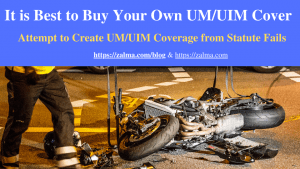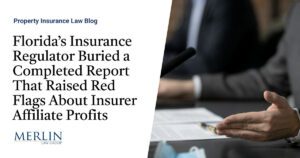It is Best to Buy Your Own UM/UIM Cover

See the full video at https://rumble.com/v1m0blo-it-is-best-to-buy-your-own-umuim-cover.html and at https://youtu.be/KOjhheawNq8
Statue Limits Its Effect
In Scott C. Malzberg, a/k/a Scott Malzberg v. Caren L. Josey, James River Insurance Company, Portier, LLC, and Rider Insurance Company, No. A-2883-20, Superior Court of New Jersey, Appellate Division (September 27, 2022) Scott C. Malzberg appealed from the Law Division order granting summary judgment in favor of defendant James River Insurance Company (James River), dismissing plaintiff’s claim for underinsured (UIM) motorist coverage. The case presented a question of first impression regarding the scope of the Transportation Network Company Safety and Regulatory Act (TNCSRA or Act).
Plaintiff was injured in a motor vehicle accident while he was operating his motorcycle as an Uber Eats delivery driver. The sole legal issue raised by the appeal is whether the Act-which requires “transportation network companies” (TNCs) to provide at least $1.5 million in underinsured motorist coverage- applies to food delivery services, such as Uber Eats.
In granting summary judgment dismissal, the trial court held that the Act only regulates companies that use a digital network such as a mobile phone application (app) to connect a “rider” to a “prearranged ride” and that the Act applies only to the prearranged transport of persons and not to the delivery of food. The court found that nothing in the statutory text or legislative history of the TNCSRA suggested that the Legislature intended to regulate app-based food delivery services.
Plaintiff enrolled with defendant Portier, LLC (Portier) to use his personal vehicle-a motorcycle-to deliver food. The Uber Eats app allows food delivery service providers and restaurants to connect with each other so that they can fulfill orders placed by consumers.
On August 17, 2017, plaintiff was in the process of making a food delivery for Uber Eats when a vehicle driven by defendant Caren L. Josey (Josey) collided with plaintiff’s motorcycle. Plaintiff was thrown from the motorcycle and sustained significant injuries requiring multiple surgeries.
Josey was insured by CURE Auto Insurance with bodily injury liability coverage limited to $15,000 per person and $30,000 per accident. Plaintiff’s injuries exceeded the limits of Josey’s personal auto insurance policy. Portier had procured a business auto insurance policy from James River to protect it from liability as a result of actions of Malzberg.
However, the James River policy defines an “insured” to include “Delivery Drivers” who have entered into a contract to use the “UberPartner Application” and who have logged into the “UberPartner Application” but did not provide underinsured motorist benefits.
A stipulation of dismissal with prejudice was filed as to defendant Rider Insurance Company on June 29, 2020.
ANALYSIS
The New Jersey Supreme Court has clearly stated that “[t]he overriding goal of all statutory interpretation ‘is to determine as best we can the intent of the Legislature, and to give effect to that intent.’” State v. S.B., 230 N.J. 62, 67 (2017). Consequently, to determine the Legislature’s intent, the court looks to the statute’s language and give those terms their plain and ordinary meaning because the best indicator of that intent is the plain language chosen by the Legislature.
The core issue is whether the Act regulates app-based food delivery services or instead is limited to regulating companies and drivers that arrange and provide transportation services for passengers.
The Statute
“Transportation network company” means a corporation, partnership, sole proprietorship, or other entity that is registered as a business in the State or operates in this State, and uses a digital network to connect a transportation network company rider to a transportation network company driver to provide a prearranged ride. “Transportation network company driver” or “driver” means a person who receives connections to potential riders and related services from a transportation network company in exchange for payment of a fee to the transportation network company, and uses a personal vehicle to offer or provide a prearranged ride to a rider upon connection through a digital network controlled by a transportation network company in return for compensation or payment of a fee.
Most notably, nothing in the Act refers to the delivery of food. The absence of any reference to food delivery in the definition section stands in stark contrast to the interrelated definitions that refer explicitly and repeatedly to “rides” and “riders,” which clearly denote the transport of human passengers.
The absence of any reference in the definition section to any vehicles that transport goods rather than passengers supports the court’s conclusion that the Legislature in enacting the TNCSRA was concerned only with vehicles while they are being used to transport persons.
Aside from the definition section, the text of the entire Act includes only one explicit reference to services that involve the transport of something other than persons, and that reference is done in the context of explaining what transportation network companies and drivers may not do if they are to remain within the scope of the Act.
In sum, the court concluded that the primary question posed in this case is easily resolved under a plain-text analysis. The statutory scheme comprehensively regulates app-based services that provide rides to human passengers. As the court stressed, nothing in the statutory text mentions, much less comprehensively regulates, the delivery of food. In these circumstances, the court did not need to consider extrinsic sources to determine legislative intent.
The appellate court found further extrinsic support for its interpretation of the Act in the regulations that have been promulgated by the MVC.
In the final analysis, it is for the Legislature, not trial or intermediate appellate courts, to fill the void to which plaintiff alludes where the statute fails to deal with those who deliver food, like the plaintiff, rather than those who deliver people.
The Court of Appeal refused to venture an opinion on whether that pending legislation supports or undermines plaintiff’s arguments on this appeal. Reliance on proposed or pending legislation to interpret existing statutes is of little value. There is no value from legislative proposals that are not enacted into law. The TNCSRA in its present form does not apply to the circumstances of this case.
The suit was imaginative and provided interpretations of a statute that are limited to people who deliver people not food or other products. Malzberg, through is employer, had liability coverage and, if he wanted to be protected, could have purchased UM/UIM coverage for himself. Neither he nor his agency/employer did so. He was appropriately unable to get the court to expand the meaning of a statute by suggestion. Insurance is not a right it is a choice.
(c) 2022 Barry Zalma & ClaimSchool, Inc.
Barry Zalma, Esq., CFE, now limits his practice to service as an insurance consultant specializing in insurance coverage, insurance claims handling, insurance bad faith and insurance fraud almost equally for insurers and policyholders. He practiced law in California for more than 44 years as an insurance coverage and claims handling lawyer and more than 54 years in the insurance business. He is available at http://www.zalma.com and zalma@zalma.com.Subscribe and receive videos limited to subscribers of Excellence in Claims Handling at locals.com https://zalmaoninsurance.locals.com/subscribe.Subscribe to Excellence in Claims Handling at https://barryzalma.substack.com/welcome.
Now available Barry Zalma’s newest book, The Tort of Bad Faith, available here. The new book is available as a Kindle book, a paperback or as a hard cover.
Write to Mr. Zalma at zalma@zalma.com; http://www.zalma.com; http://zalma.com/blog; daily articles are published at https://zalma.substack.com. Go to the podcast Zalma On Insurance at https://anchor.fm/barry-zalma; Follow Mr. Zalma on Twitter at https://twitter.com/bzalma; Go to Barry Zalma videos at Rumble.com at https://rumble.com/c/c-262921; Go to Barry Zalma on YouTube- https://www.youtube.com/channel/UCysiZklEtxZsSF9DfC0Expg; Go to the Insurance Claims Library – https://zalma.com/blog/insurance-claims-library
Like this:
Loading…
Related




